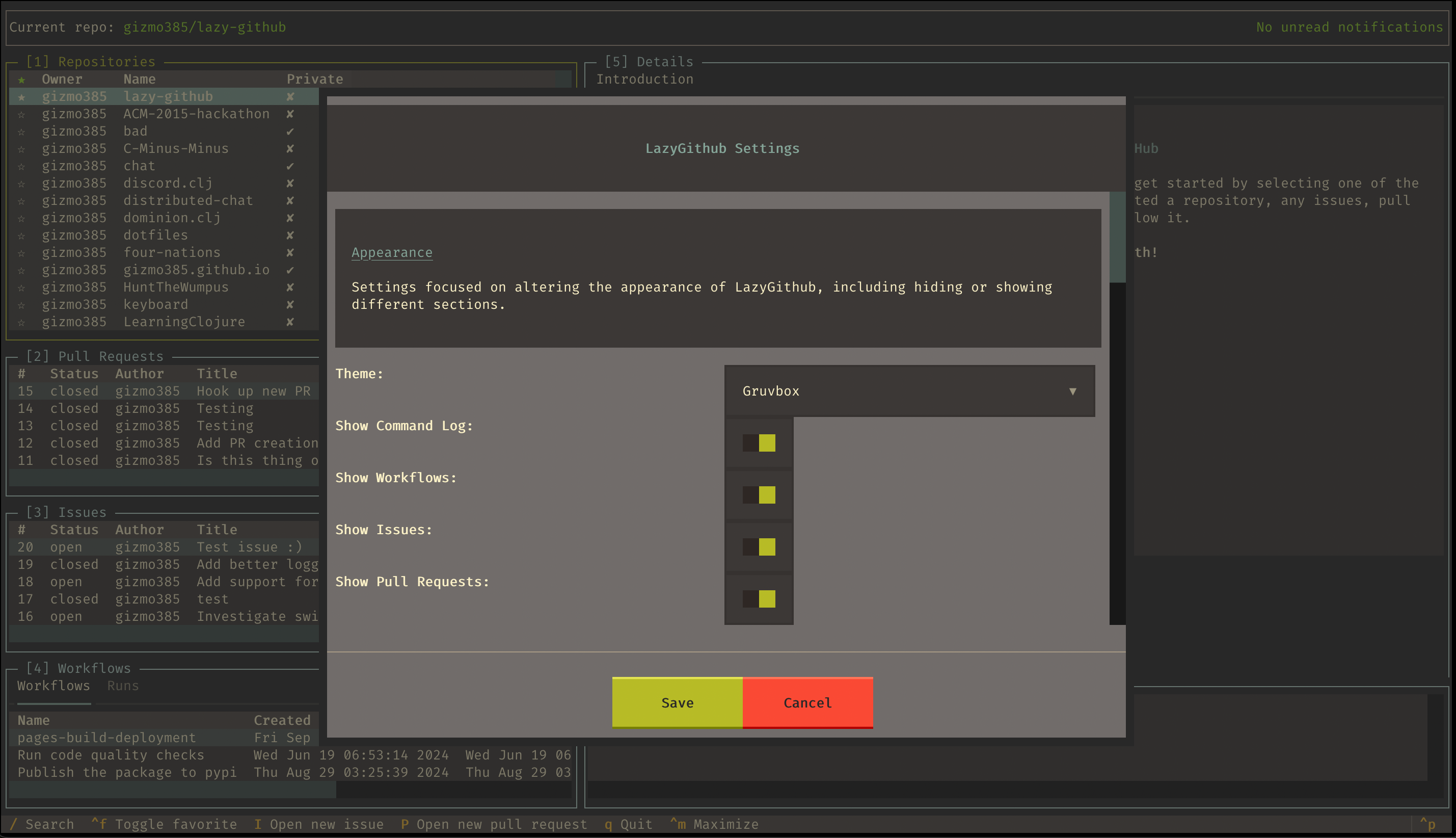https://github.com/gizmo385/gh-lazy
A terminal UI for interacting with GitHub
https://github.com/gizmo385/gh-lazy
gh-extension github terminal-ui textual tui
Last synced: 2 months ago
JSON representation
A terminal UI for interacting with GitHub
- Host: GitHub
- URL: https://github.com/gizmo385/gh-lazy
- Owner: gizmo385
- License: mit
- Created: 2024-06-10T03:55:13.000Z (over 1 year ago)
- Default Branch: main
- Last Pushed: 2025-07-09T08:09:16.000Z (3 months ago)
- Last Synced: 2025-07-09T08:59:46.494Z (3 months ago)
- Topics: gh-extension, github, terminal-ui, textual, tui
- Language: Python
- Homepage:
- Size: 1.86 MB
- Stars: 16
- Watchers: 1
- Forks: 0
- Open Issues: 6
-
Metadata Files:
- Readme: README.md
- License: LICENSE
Awesome Lists containing this project
README
 
LazyGithub is a terminal UI client for interacting with [GitHub](https://github.com). It draws heavy inspiration from the
[lazygit](https://github.com/jesseduffield/lazygit) project and uses [Textual](https://textual.textualize.io/) to drive the terminal UI interactions.

## How to Use It
### Installing with the Github CLI
If you have the Github CLI installed, you can install LazyGithub as an extension with `gh extension install gizmo385/gh-lazy` and then running `gh lazy` to run it.
### Installing from PyPi
You can run the [most recently built version](https://pypi.org/project/lazy-github/) by installing it from PyPI. If you have [uv installed](https://github.com/astral-sh/uv), you can do that easily with `uvx lazy-github`.
When you first start LazyGithub, you will be prompted with a device login code and a link to GitHub
where you will be able to authenticate the app against your account. This allows the app to act on
your behalf and is necessary for LazyGithub to function.
Currently, it supports the following:
- Listing the repositories associated with your account
- Listing the issues, pull requests, and actions on your repositories
- Listing the details, diff, and reviews on any of those pull requests
- Detailed issue and pull request views, including conversation participation
### Reporting Bugs
If you run into any bugs while using LazyGithub, please let me know! You can do this by creating a
new [bug report](https://github.com/gizmo385/gh-lazy/issues/new?template=bug_report.md) or search
for `Open Bug Report` in the command pallete from inside LazyGithub.
[](https://asciinema.org/a/JiTZqOWyEjPzG4v1marSyTqUV)
### Running Locally
If you wish to run it from a local clone of the repository, you can do so by running the `./start.sh` located in the root of the repo.
## Customization
LazyGithub supports a number of customization options, all of which are stored in `$HOME/.config/lazy-github/config.json`.
These can be edited manually via changing the config or by opening the settings management UI within LazyGithub. That UI
can be accessed via the command pallete (`CMD+p`) and then searching for settings.
